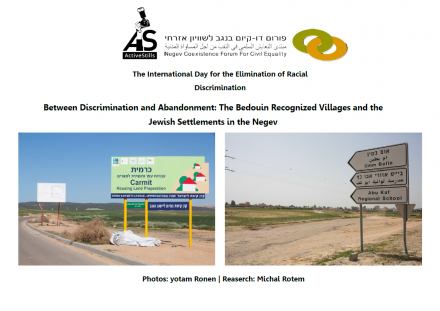
Negev Coexistence Forum for Civil Equality
פורום דו-קיום בנגב לשוויון אזרחי
منتدى التعايش السلمي في النقب من أجل المساواة المدنية
New Photo-Report: Between Discrimination and Abandonment: The Bedouin Recognized Villages and the Jewish Settlements in the Negev
21.03.2014
On the occasion of the International Day for the Elimination of Racial Discrimination (21 March), Negev Coexistence Forum and Activestills publish a photo report that compares between the Bedouin Recognized Villages and the Jewish Settlements in the Negev. The report reveals that while tens of thousands of housing units are planned to be built in Jewish settlements, within the Bedouin villages that were recognized by the state, the denial of building permits continues, as well as the house demolitions policy.
In 2003, when the first Bedouin regional council of Abu Basma was established by the Israeli Government, seven Bedouin villages that were recognized by the state, were brought under the council’s jurisdiction. Until 2006, another four villages gained recognition. At the same period, five Jewish settlements were established and resettled, another four are under advanced planning and establishment stages, and at least twelve more settlement are planned to be built.
The photo report, issued by Activestills and NCF, exposes the fact that more than a decade after the recognition of the Bedouin villages, the changes on the ground are sparse. Out of eleven villages, ten are not connected to the national electricity grid and the sewage system, and in order to connect houses to the state’s water pipes, residents must lay pipes on their own expense from a central water station at the entrance to their village. In addition, the majority of the village does not enjoy a full service of garbage disposal, paved roads are to be find only in one village, and in villages with thousands of residents, only one clinic is available. Though many schools were established in the villages over the last couple of years, the shortage of classes is noticeable, and some of the pupils are still transported every morning to high schools in governmental planned Bedouin towns.
Furthermore, building permits in the Bedouin villages are almost not issued at all. Besides Tarabin A-Sana, where many building permits were issued, in Abu Krinat (pop; 1800), recognized in 2003, only three permits have so far been issued, in A-Sayyed (pop; 4000), recognized in 2006, only one permit has been issued. In the other eight villages no permits were issued since their recognition. Years after recognition was granted by the government, the planning authorities does not allow construction in the recognized villages. Although population growth, the residents of the villages are not able to build new houses in their villages. Therefore, new houses that are being built with no permits and houses that are being renovated are declared by the authorities as illegal, and subjected to the house demolition policy of the state, that threaten to impose the demolition costs on its dwellers.
On the contrary, Jewish settlements that are being built in the Negev enjoy the variety of services and infrastructures that the goverment provides. Tens of thousands of housing units are planned, expansions are planned for existing settlements, and new settlements are planned to be established. Furthermore, even illegal settlements and farms are regularized retrospectively. The house demolition policy is not implemented toward the Jewish population in the Negev, it is reserved only for the Bedouin villages.
On the international day for the elimination of racial discrimination 2014, the comparison between the Bedouin recognized villages and the new Jewish settlements exposes the discrimination pertains among these communities. The Israeli Government should act immediately: establish infrastructures in the villages, expand the governmental services provided, and cease the house demolitions while issuing building permits for its citizens resident there. It is inconceivable that the government is involved with the establishment of tens of thousands of new housing units in Jewish settlement as part of a variety of additional plans that aims to move Jewish populations to the Negev area, while Bedouin citizens of the state that reside in the area for years are not provided with extremely basic services like running water and electricity.


 Youtube
Youtube
 Twitter
Twitter
 Facebook
Facebook